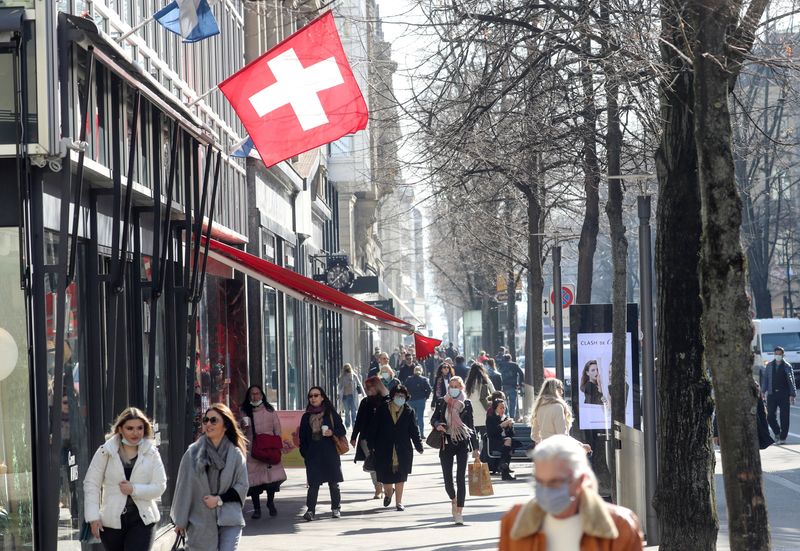Switzerland cuts growth forecasts given energy risks, inflation
2022.09.20 03:45
[ad_1]

© Reuters. FILE PHOTO: Shoppers walk along the street after the Swiss government relaxed some of its COVID-19 restrictions, as the spread of the coronavirus disease continues, at the Bahnhofstrasse shopping street in Zurich, Switzerland March 1, 2021. REUTERS/Arnd W
ZURICH (Reuters) -The Swiss government significantly cut its economic growth forecasts on Tuesday, citing growing risks from a “tense energy situation and sharp price increases”.
It now expects the country’s economy to expand 2.0% this year, down from its June forecast for 2.6% growth. [L8N2Y229W]
In 2023 the economy is expected to expand by 1.1%, the State Secretariat for Economic Affairs (SECO) said, down from the previous expectation of a 1.9% increase.
The figures are adjusted to remove the effect of major sporting events.
“After a positive first half of the year 2022, the Swiss economy now faces a deteriorating outlook,” SECO said. “A tense energy situation and sharp price increases are weighing on economic prospects, especially in Europe.”
SECO increased its inflation forecast, saying it expected consumer prices to rise by 3% in 2022 and 2.3% in 2023. Previously it had expected inflation of 2.5% this year and 1.4% in 2023.
Earlier this month three of Germany’s leading economic institutes lowered their forecast for Europe’s largest economy next year, predicting high energy prices caused by the Ukraine war would take their toll.
Switzerland, which is less dependent on Russian gas and has seen significantly lower inflation than the neighbouring euro zone, traditionally has one of Europe’s more robust economies.
SECO said a favourable unemployment situation in Switzerland, with an expected jobless rate of 2.2% this year and 2.3% next, would continue to support domestic demand.
But foreign demand was expected to weaken, with less demand for Swiss products expected from the euro zone, the United States and China than previously forecast.
The overall outlook for the Swiss economy largely depended on the global economy and how the energy supply situation developed, SECO said, saying the sharp drop in Russian gas flows had raised the risk of shortages in Europe.
Although its forecasts were based on the assumption there would be no shortages, the Swiss economy would be “severely affected” if there was a reduction in gas or electricity, it said.
Rising interest rates, introduced by central banks around the world to tackle inflation, also increased problems associated with global debt and financial markets, it added.
[ad_2]
Source link








